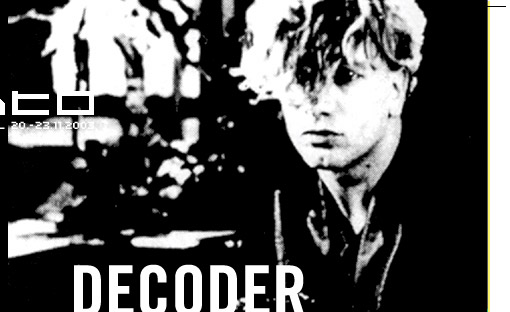


Hamburg, 1983. F.M. is a youngster leading an idle urban life, totally alienated from his environment, and only active when making "sound experiments" in his home studio. Christiana, his girlfriend, works in a peepshow on Reeperbahn. A chronically depressed customer is infatuated by her and tries to get more closely acquainted. The relationship between F.M. and Christiana is cool and distant, except for the moments at breakfast, when they share the muddled visions of their dreams. One day F.M. suddenly wakes up to the surrounding reality, as he notices how the inconspicuous background music at a hamburger joint may have some connection with the junk food. It dawns on him that muzak is designed to control and brainwash the masses, not unlike lobotomy. On top of its paralysing effects, muzak is also laced with subliminal messages. F.M. decides to go back to the bar and records the muzak for his own purposes. He starts to develop a form of "anti-muzak" in his studio, by playing the original material backwards, or at a wrong speed, or by mixing it with interfering factors like sounds of street riots or squealing frogs. In a dream of his F.M. receives support for his one-man war from an old shopkeeper (William Burroughs) selling electronics spare parts. He gives F.M. a disassembled cassette with the advice "This is all you need!" While wandering around the city, F.M. runs into members of a shady cult, "the pirates", who have taken over an abandoned building in order to practice their nocturnal rituals of "black noise". The core of their high priest's (Genesis P-Orridge) message is: "Information is like a bank. Some of us are rich, while others are poor. It is our mission to rob that bank…" F.M. and the pirates decide to co-operate. They perform terrorist attacks in Burger Kings and McDonalds, armed with cassette players and anti-muzak. The customers get sudden nausea attacks and start rushing to the exits… The action continues around the city, until the mighty Muzak Corporation intervenes by sending agent Jäger to track down the tape terrorists. Things get complicated when F.M. finds out that Christiana's secret admirer and regular peepshow visitor is none other than Jäger himself. All the while, F.M. and the pirates keep copying more anti-muzak cassettes and distributing them to people in the streets. Mass hysteria and general chaos ensue… Der Zeitgeist Decoder still manages to baffle today. It is, at the same time, (inadvertently) comical as well as haunting. Its political views on society are extremely black-and-white but undeniably strong as a bleak vision of the world to come. The film combines the instability of the two German nations and the nascent political activism, with Burroughs' theory of "the information war". And, as so many times before, reality surpassed fiction. The film crew shot parts of the movie in West Berlin and planned to plant actors with cassette players among the protesters against Ronald Reagan's state visit, with the intention of editing the footage to create the impression that it is F.M. and his cohorts who are organizing the provocations in the streets. Once on location, they noticed that "audio terrorism" was already being practiced by the local anarchists, who had duplicated and distributed tapes full of frantic sounds of battle from war zones, sounds of descending helicopters, random gunfire and the like. "They put tape recorders in windows, and if you're in the street and you hear all these noises and you don't know where it's coming from and you think where is that fucking helicopter, where is that shooting coming from? People got confused and angrier. It actually worked. They even busted tape recorders. They confiscated 200 tape recorders. It was really funny," writer/producer Klaus Maeck told Vague magazine in 1984. Glowing in colours of green, red and pallid blue, Decoder was pieced together by a bunch of enthusiastic first-timers. As Maeck reminisces: "Everybody did everything." The screenplay was put down to Maeck, Trini Trimpop, and Volker Schaefer. The fourth member of the collective, Muscha, ended up as the director only one day before shooting began, "since he was the loudest and most secure in directing people." The casting is interesting, to say the least: F.M.Einheit (of Einstürzende Neubauten) in the leading role is phenomenal as the decadent kool kat. His tired girlfriend is played by Christiane Felscherinow, the original inspiration for the movie Christiane F. (dir. Uli Edel, 1981). The laconic New York actor Bill Rice is the face of the sorely tried muzak detective, whereas Genesis P-Orridge (of Throbbing Gristle / Psychic TV) makes a splendid cameo as the disturbed high priest. On the trail of boy scouts Decoder takes the concept even further and delves into it with the means of a fictional story. In his novels The Job (1970) and The Revised Boy Scout Manual (1970) the beat icon Burroughs had already introduced his ideas of sounds as potential weapons of political struggle and the technical instructions for that particular brand of terrorism. Despite its brevity, Burroughs' appearance in Decoder proves to be a key scene, as the whole movie is an implementation of the author's idea: "Young people in the West have been lied to, sold out, and betrayed. Best thing they can do is take the place apart before they are destroyed in a nuclear war." In Decoder, Burroughs' The Wild Boys (1971) have been updated as characters in the post-punk and industrial scene in Berlin. One last matter of curiosity: beat painter Bryon Gysin's mind-expanding Dreamachine also makes an appearance in Decoder, as F.M. gets acquainted with it in a rite of passage for the black noise cult. |
Decoder is screened in the Kiasma Theatre on Friday, November 20th at 15:30. N.B.! No subtitles! The film is in English and German. R-18. Links: |